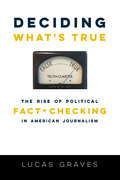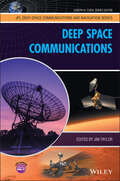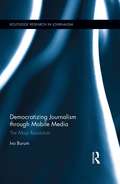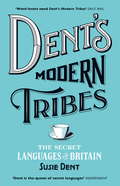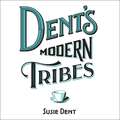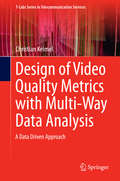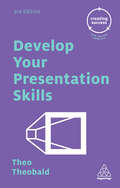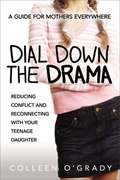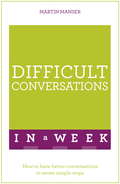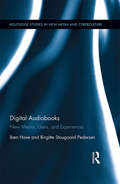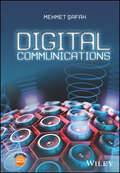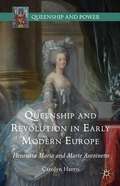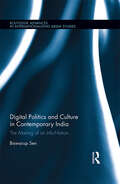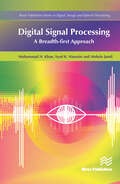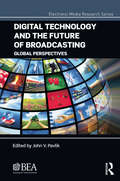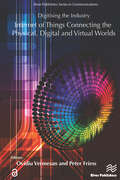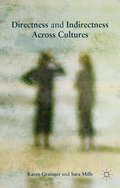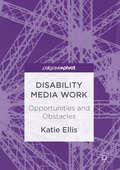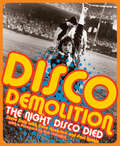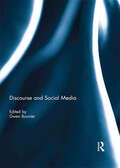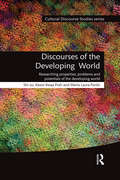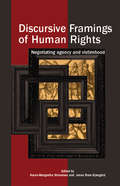- Table View
- List View
Deciding What’s True: The Rise of Political Fact-Checking in American Journalism
by Lucas GravesOver the past decade, American outlets such as PolitiFact, FactCheck.org, and the Washington Post's Fact Checker have shaken up the political world by holding public figures accountable for what they say. Cited across social and national news media, these verdicts can rattle a political campaign and send the White House press corps scrambling. Yet fact-checking is a fraught kind of journalism, one that challenges reporters' traditional roles as objective observers and places them at the center of white-hot, real-time debates. As these journalists are the first to admit, in a hyperpartisan world, facts can easily slip into fiction, and decisions about which claims to investigate and how to judge them are frequently denounced as unfair play. Deciding What's True draws on Lucas Graves's unique access to the members of the newsrooms leading this movement. Graves vividly recounts the routines of journalists at three of these hyperconnected, technologically innovative organizations and what informs their approach to a story. Graves also plots a compelling, personality-driven history of the fact-checking movement and its recent evolution from the blogosphere, reflecting on its revolutionary remaking of journalistic ethics and practice. His book demonstrates the ways these rising organizations depend on professional networks and media partnerships yet have also made inroads with the academic and philanthropic worlds. These networks have become a vital source of influence as fact-checking spreads around the world.
Deep Space Communications
by Jim TaylorA collection of some of the Jet Propulsion Laboratory's space missions selected to represent the planetary communications designs for a progression of various types of missions The text uses a case study approach to show the communications link performance resulting from the planetary communications design developed by the Jet Propulsion Laboratory (JPL). This is accomplished through the description of the design and performance of six representative planetary missions. These six cases illustrate progression through time of the communications system's capabilities and performance from 1970s technology to the most recent missions. The six missions discussed in this book span the Voyager for fly-bys in the 1970s, Galileo for orbiters in the 1980s, Deep Space 1 for the 1990s, Mars Reconnaissance Orbiter (MRO) for planetary orbiters, Mars Exploration Rover (MER) for planetary rovers in the 2000s, and the MSL rover in the 2010s. Deep Space Communications: Provides an overview of the Deep Space Network and its capabilities Examines case studies to illustrate the progression of system design and performance from mission to mission and provides a broad overview of the missions systems described Discusses actual flight mission telecom performance of each system Deep Space Communications serves as a reference for scientists and engineers interested in communications systems for deep-space telecommunications link analysis and design control. Jim Taylor is a principal engineer at JPL, working on telecommunications analysis, ground-system implementation, and flight operations for deep-space and Earth-orbiting projects. He was the founding telecommunications member of JPL's Spaceflight Significant Events Group, now called Lessons Learned. He received the NASA Exceptional Achievement Medal in 2000 for innovative use of the DS1 communications systems and the NASA Exceptional Service Medal in 2006 for operational development and support on Deep Impact.
Democracy’s Detectives: The Economics of Investigative Journalism
by James T. HamiltonInvestigative journalism holds democracies and individuals accountable to the public. But important stories are going untold as news outlets shy away from the expense of watchdog reporting. Computational journalism, using digital records and data-mining algorithms, promises to lower the cost and increase demand among readers, James Hamilton shows.
Democratizing Journalism through Mobile Media: The Mojo Revolution (Routledge Research in Journalism)
by Ivo BurumFuelled by a distrust of big media and the development of mobile technologies, the resulting convergence of journalism praxis (professional to alternative), workflows (analogue to multipoint digital) and platforms (PC to mobile), result in a 24-hour always-on content cycle. The information revolution is a paradigm shift in the way we develop and consume information, in particular the type we call news. While many see this cultural shift as ruinous, Burum sees it as an opportunity to utilize the converging information flow to create a galvanizing and common digital language across spheres of communication: community, education and mainstream media. Embracing the digital literacies researched in this book will create an information bridge with which to traverse journalism’s commercial precarity, the marginalization of some communities, and the journalism school curricula.
Dent's Modern Tribes: The Secret Languages of Britain
by Susie DentDid you know that . . . a soldier's biggest social blunder is called jack brew - making yourself a cuppa without making one for anyone else? That twitchers have an expression for a bird that can't be identified - LBJ (the letters stand for Little Brown Job)? Or that builders call plastering the ceiling doing Lionel Richie's dancefloor? Susie Dent does.Ever wondered why football managers all speak the same way, what a cabbie calls the Houses of Parliament, or how ticket inspectors discreetly request back-up? We are surrounded by hundreds of tribes, each speaking their own distinct slanguage of colourful words, jokes and phrases, honed through years of conversations on the battlefield, in A&E, backstage, or at ten-thousand feet in the air. Susie Dent has spent years interviewing hundreds of professionals, hobbyists and enthusiasts, and the result is an idiosyncratic phrasebook like no other. From the Freemason's handshake to the publican's banter, Dent's Modern Tribes takes us on a whirlwind tour of Britain, decoding its secret languages and, in the process, finds out what really makes us all tick.
Dent's Modern Tribes: The Secret Languages of Britain
by Susie DentDid you know that . . . a soldier's biggest social blunder is called jack brew - making yourself a cuppa without making one for anyone else? That twitchers have an expression for a bird that can't be identified - LBJ (the letters stand for Little Brown Job)? Or that builders call plastering the ceiling doing Lionel Richie's dancefloor? Susie Dent does.Ever wondered why football managers all speak the same way, what a cabbie calls the Houses of Parliament, or how ticket inspectors discreetly request back-up? We are surrounded by hundreds of tribes, each speaking their own distinct slanguage of colourful words, jokes and phrases, honed through years of conversations on the battlefield, in A&E, backstage, or at ten-thousand feet in the air. Susie Dent has spent years interviewing hundreds of professionals, hobbyists and enthusiasts, and the result is an idiosyncratic phrasebook like no other. From the Freemason's handshake to the publican's banter, Dent's Modern Tribes takes us on a whirlwind tour of Britain, decoding its secret languages and, in the process, finds out what really makes us all tick.
Dent's Modern Tribes: The Secret Languages of Britain
by Susie DentDid you know that . . . a soldier's biggest social blunder is called jack brew - making yourself a cuppa without making one for anyone else? That twitchers have an expression for a bird that can't be identified - LBJ (the letters stand for Little Brown Job)? Or that builders call plastering the ceiling doing Lionel Richie's dancefloor? Susie Dent does.Ever wondered why football managers all speak the same way, what a cabbie calls the Houses of Parliament, or how ticket inspectors discreetly request back-up? We are surrounded by hundreds of tribes, each speaking their own distinct slanguage of colourful words, jokes and phrases, honed through years of conversations on the battlefield, in A&E, backstage, or at ten-thousand feet in the air. Susie Dent has spent years interviewing hundreds of professionals, hobbyists and enthusiasts, and the result is an idiosyncratic phrasebook like no other. From the Freemason's handshake to the publican's banter, Dent's Modern Tribes takes us on a whirlwind tour of Britain, decoding its secret languages and, in the process, finds out what really makes us all tick.(P)2016 John Murray Press
Design of Video Quality Metrics with Multi-Way Data Analysis
by Christian KeimelThis book proposes a data-driven methodology using multi-way data analysis for the design of video-quality metrics. It also enables video- quality metrics to be created using arbitrary features. This data- driven design approach not only requires no detailed knowledge of the human visual system, but also allows a proper consideration of the temporal nature of video using a three-way prediction model, corresponding to the three-way structure of video. Using two simple example metrics, the author demonstrates not only that this purely data- driven approach outperforms state-of-the-art video-quality metrics, which are often optimized for specific properties of the human visual system, but also that multi-way data analysis methods outperform the combination of two-way data analysis methods and temporal pooling.
Develop Your Presentation Skills
by Theo TheobaldDevelop Your Presentation Skills offers step-by-step realistic advice to improve your confidence, prepare effectively and nail that presentation.Going beyond just handling nerves and presenting PowerPoint slides, Develop Your Presentation Skills provides you with a practical toolkit for developing a belting presentation and improving your confidence along the way. It includes practical help with unpicking the original brief, understanding just what the audience wants, facing your performance demons and constructing compelling content that will keep your audience rapt with attention. Complete with anecdotes and expert input to help you avoid disaster, this new edition also includes two brand new chapters, which help you to deliver a presentation 'stripped bare' and to use new media to engage with your audience. Develop Your Presentation Skills will help you find your voice and use it with style; to inform, to persuade, to impress.The creating success series of books...With over one million copies sold, the hugely popular Creating Success series covers a wide variety of topics and is written by an expert team of internationally best-selling authors and business experts. This indispensable business skills collection is packed with new features, practical content and inspiring guidance for readers across all stages of their careers.
Dial Down the Drama: Reducing Conflict and Reconnecting with Your Teenage Daughter¿A Guide for Mothers Everywhere
by Colleen O'GradyTeen daughters are on an emotional rollercoaster, and responding in kind adds fuel to the fire. It&’s important for moms to be a stable anchor during this stage in their life.Family therapist and mom Colleen O&’Grady shares what she learned firsthand during her own daughter&’s teenage years about how best to calmly de-escalate even the most stressful scenes and parent intentionally even when your teen is pushing you away.In Dial Down the Drama, O&’Grady shows every mom how to learn to:Regain perspectiveBreak the cycle of conflictTune into her daughter without drowning in the dramaFoster spontaneous conversationsReplace worrying and overreacting with effective communication and actionAnd much more!Moodiness, anger, and defiance can stress the best of us. This empowering guide gives you the tools you need to defuse the drama - and dial up the joy.As Colleen has said, you don&’t dial down the drama in order to survive the teenage years; you do so because you actually can enjoy them! Dial Down the Drama provides the tools you need to do just that.
Dialogue, Argumentation and Education
by Michael J. Faith Baker Resnick Lauren B. Schwarz Baruch B. Michael J. Schantz Faith SchantzNew pedagogical visions and technological developments have brought argumentation to the fore of educational practice. Whereas students previously 'learned to 'argue', they now 'argue to learn': collaborative argumentation-based learning has become a popular and valuable pedagogical technique, across a variety of tasks and disciplines. Researchers have explored the conditions under which arguing to learn is successful, have described some of its learning potentials (such as for conceptual change and reflexive learning) and have developed Internet-based tools to support such learning. However, the further advancement of this field presently faces several problems, which the present book addresses. Three dimensions of analysis - historical, theoretical and empirical - are integrated throughout the book. Given the nature of its object of study - dialogue, interaction, argumentation, learning and teaching - the book is resolutely multidisciplinary, drawing on research on learning in educational and psychological sciences, as well as on philosophical and linguistic theories of dialogue and argumentation.
Difficult Conversations In A Week: How To Have Better Conversations In Seven Simple Steps
by Martin ManserDifficult conversations just got easierHow do you deal professionally with a colleague whose work is seriously below standard? A supplier who is always late? Saying 'no' graciously? Giving someone bad news? Many of us have been on the receiving end of business conversations that have been badly handled, poorly timed or scarcely prepared for by the person we're talking to. This practical book offers help to new and aspiring managers in a variety of business situations, such as delivering bad news in an appraisal, and how to work with a range of colleagues who may be lazy, negative orincompetent.Whether you choose to read it in a week or in a single sitting, Difficult Conversations In A Week is your fastest route to success:- Sunday: Why are some conversations difficult? We may tend to avoid difficult conversations: how else can you deal with them? - Monday: Manage your emotions Distinguish the facts of an incident and how colleagues feel about it and their sense of identity.- Tuesday: Prepare well The venue, atmosphere and timing of a difficult conversation are all important. It is essential that you prepare well, especially your opening words and the direction that you want the conversation to go in, including alternative ways to resolve the issue.- Wednesday: Listen carefully As you listen, you discover more about your colleague's background and motivation. You also need to learn how to ask incisive questions that get to the root of an issue.- Thursday: Treat colleagues with respect In a difficult conversation, you need to affirm your colleague and continue to listen until they feel heard. You will explain your point of view politely, yet firmly, being neither passive nor aggressive in tone.- Friday: Seek change Involve colleagues in a conversation; learn how to deal with certain kinds of colleagues, for example, those who are lazy, aggressive or shy.- Saturday: Build trusting relationships Work hard to develop strong working relationships, so that when you have to have a difficult conversation, you will be better placed to do sobecause you will know the person better.
Digital Audiobooks: New Media, Users, and Experiences (Routledge Studies in New Media and Cyberculture)
by Iben Have Birgitte Stougaard PedersenAudiobooks are rapidly gaining popularity with widely accessible digital downloading and streaming services. This book engages with the digital form of audiobooks, framing audiobook listening as both a remediation of literature and an everyday activity that creates new reading experiences that can be compared to listening to music or the radio. Have and Stougaard Pedersen challenge the historical notion that audiobook listening is a compensatory activity or a second-rate reading experience, while seeking to establish a dialogue between sound studies and media studies, comparative literature, aesthetics, and sociology.
Digital Communications
by Mehmet SafakThis is a modern textbook on digital communications and is designed for senior undergraduate and graduate students, whilst also providing a valuable reference for those working in the telecommunications industry. It provides a simple and thorough access to a wide range of topics through use of figures, tables, examples and problem sets. The author provides an integrated approach between RF engineering and statistical theory of communications. Intuitive explanations of the theoretical and practical aspects of telecommunications help the reader to acquire a deeper understanding of the topics. The book covers the fundamentals of antennas, channel modelling, receiver system noise, A/D conversion of signals, PCM, baseband transmission, optimum receiver, modulation techniques, error control coding, OFDM, fading channels, diversity and combining techniques, MIMO systems and cooperative communications. It will be an essential reference for all students and practitioners in the electrical engineering field.
Digital Identity and Everyday Activism: Sharing Private Stories With Networked Publics (Palgrave Studies in Communication for Social Change)
by Sonja VivienneThis book reinvigorates the space between scholarly texts on self-representation, voice and agency and practical field-guides to community media and digital storytelling. It offers reflection on the ethical praxis of co-creative media, and an indispensable suite of digitally savvy representation strategies, pertinent to modern people everywhere.
Digital Politics and Culture in Contemporary India: The Making of an Info-Nation (Routledge Advances in Internationalizing Media Studies)
by Biswarup SenThe relationship between information and the nation-state is typically portrayed as a face-off involving repressive state power and democratic flows: Twitter and the Arab Spring, Google in China, WikiLeaks and the U.S. State Department. Less attention has been paid to those scenarios where states have regarded information and its diffusion as productive of modernity and globalization. It is the central argument of this book that the contemporary nation-state, especially in the global South, is far from hostile to the current informational milieu and in fact makes crucial use of it in order to develop adequate modes of governance, communication and sociality in a networked world. This book focuses on India – an emerging country that has recently witnessed a "software miracle" – to highlight the critical role informatics has historically played in the national imagination and to demonstrate how the state, private capital and civic society have drawn upon and engaged the precepts and protocols of the information age to fashion an "info-nation."
Digital Signal Processing: A Breadth-First Approach
by Muhammad Khan Syed K. Hasnain Mohsin JamilThe subject of Digital Signal Processing (DSP) is enormously complex, involving many concepts, probabilities, and signal processing that are woven together in an intricate manner. To cope with this scope and complexity, many DSP texts are often organized around the “numerical examples” of a communication system. With such organization, readers can see through the complexity of DSP, they learn about the distinct concepts and protocols in one part of the communication system while seeing the big picture of how all parts fit together. From a pedagogical perspective, our personal experience has been that such approach indeed works well.Based on the authors’ extensive experience in teaching and research, Digital Signal Processing: a breadth-first approach is written with the reader in mind. The book is intended for a course on digital signal processing, for seniors and undergraduate students. The subject has high popularity in the field of electrical and computer engineering, and the authors consider all the needs and tools used in analysis and design of discrete time systems for signal processing.Key features of the book include:• The extensive use of MATLAB based examples to illustrate how to solve signal processing problems. The textbook includes a wealth of problems, with solutions• Worked-out examples have been included to explain new and difficult concepts, which help to expose the reader to real-life signal processing problems• The inclusion of FIR and IIR filter design further enrich the contents
Digital Technology and the Future of Broadcasting: Global Perspectives (Electronic Media Research Series)
by John V. PavlikThis volume presents timely discussions on how digital technology is reshaping broadcasting and the media in the United States and around the world. It features contributions from distinguished scholars and young researchers, representing work that spans domestic and international issues of technological change and the implications for broadcasting and related media in a global context. Among the many issues covered are: The impact of digital technology on the structure of broadcasting organizations and regulation; The nature of broadcast content or media programming and how it is delivered at home and abroad; Engagement and interaction of the public with broadcasting and social and mobile media; and The reshaping of revenue models for broadcasters and media organizations globally. The first two parts of the volume, addressing research challenges, issues, and advances in global broadcasting, are competitively reviewed research papers which were presented at the BEA2014 Research Symposium. The third part focuses on international perspectives, with chapters from broadcasting scholars and paper discussants at the Research Symposium. This section provides reflection on the problems and prospects for research, education, and public policy that arise in this era of rapid and continuing change. As a benchmark of the remarkable changes taking place in today’s media environment, the volume sets an agenda for future research on the implications of digital technology for broadcasting and broadcasting education.
Digitising the Industry Internet of Things Connecting the Physical, Digital and VirtualWorlds
by Ovidiu Vermesan Peter FriessThis book provides an overview of the current Internet of Things (IoT) landscape, ranging from the research, innovation and development priorities to enabling technologies in a global context. A successful deployment of IoT technologies requires integration on all layers, be it cognitive and semantic aspects, middleware components, services, edge devices/machines and infrastructures. It is intended to be a standalone book in a series that covers the Internet of Things activities of the IERC - Internet of Things European Research Cluster from research to technological innovation, validation and deployment. The book builds on the ideas put forward by the European Research Cluster and the IoT European Platform Initiative (IoT-EPI) and presents global views and state of the art results on the challenges facing the research, innovation, development and deployment of IoT in the next years. The IoT is bridging the physical world with virtual world and requires sound information processing capabilities for the "digital shadows" of these real things. The research and innovation in nanoelectronics, semiconductor, sensors/actuators, communication, analytics technologies, cyber-physical systems, software, swarm intelligent and deep learning systems are essential for the successful deployment of IoT applications. The emergence of IoT platforms with multiple functionalities enables rapid development and lower costs by offering standardised components that can be shared across multiple solutions in many industry verticals. The IoT applications will gradually move from vertical, single purpose solutions to multi-purpose and collaborative applications interacting across industry verticals, organisations and people, being one of the essential paradigms of the digital economy. Many of those applications still have to be identified and involvement of end-users including the creative sector in this innovation is crucial. The IoT applications and deployments as integrated building blocks of the new digital economy are part of the accompanying IoT policy framework to address issues of horizontal nature and common interest (i.e. privacy, end-to-end security, user acceptance, societal, ethical aspects and legal issues) for providing trusted IoT solutions in a coordinated and consolidated manner across the IoT activities and pilots. In this, context IoT ecosystems offer solutions beyond a platform and solve important technical challenges in the different verticals and across verticals. These IoT technology ecosystems are instrumental for the deployment of large pilots and can easily be connected to or build upon the core IoT solutions for different applications in order to expand the system of use and allow new and even unanticipated IoT end uses. Technical topics discussed in the book include: • Introduction• Digitising industry and IoT as key enabler in the new era of Digital Economy• IoT Strategic Research and Innovation Agenda• IoT in the digital industrial context: Digital Single Market• Integration of heterogeneous systems and bridging the virtual, digital and physical worlds• Federated IoT platforms and interoperability• Evolution from intelligent devices to connected systems of systems by adding new layers of cognitive behaviour, artificial intelligence and user interfaces.• Innovation through IoT ecosystems• Trust-based IoT end-to-end security, privacy framework• User acceptance, societal, ethical aspects and legal issues• Internet of Things Applications
Directness and Indirectness Across Cultures
by Sara Mills Karen GraingerThis book analyses the complex relationship between directness, indirectness, politeness and impoliteness. Definitions of directness and indirectness are discussed and problematised from a discursive theoretical perspective.
Disability Media Work
by Katie EllisThis book interrogates trends in training and employment of people with disabilities in the media through an analysis of people with disabilities' self-representation in media employment. Improving disability representations in the media is vital to improving the social position of people with disability, and including people with lived experience of disability is integral to this process. While the media industry has changed significantly as a result of digital and participatory media, discriminatory attitudes around fear and pity continue to impact whether people with disability find work in the media. The book demonstrates no significant changes in attitudes towards employing disabled media workers since the 1990s when the last major research into this topic took place. By focusing on the employment of people with disability in media industries, Katie Ellis addresses a neglected area of media diversity, appealing to researchers in media and cultural studies as well as critical disability studies.
Disco Demolition: The Night Disco Died
by Bob Odenkirk Paul Natkin Dave Hoekstra Steve Dahl"If you were young and shiftless--and viscerally repulsed by Abba--Steve Dahl was a god. And you were drawn to Disco Demolition." --ESPN.com.In the late 1970s, disco dominated radio airwaves, much to the dismay of rock music fans. To boost attendance at Comiskey Park, the White Sox and Chicago DJ legend Steve Dahl collaborated to host Disco Demolition on July 12, 1979. Admission to the park was ninety-eight cents and a disco record. Records were destroyed on the field between games, declaring absolutely how rock fans felt about disco.Attendance exceeded fifty thousand, far beyond anyone's estimations, and when fans stormed the field for the demolition, chaos ensued. Police cleared the field, Comiskey Park was evacuated, and the second game was cancelled--for the first time in MLB history. In collaboration with Steve Dahl, Disco Demolition examines the night that changed America's disco culture forever, featuring a foreword by Bob Odenkirk and over thirty interviews with sports and music icons, including Rick Nielsen of Cheap Trick and KC and the Sunshine Band, conducted by journalist Dave Hoekstra. Also featuring a foreword by actor Bob Odenkirk (Better Call Saul, Breaking Bad) and photographs by Paul Natkin.Steve Dahl is an American radio personality and former columnist for the Chicago Tribune.Dave Hoekstra is a former columnist for the Chicago Sun-Times and a longtime radio host for WGN.Paul Natkin has photographed The Rolling Stones, Keith Richards, Brian Wilson, and many others. He was an official photographer of the Oprah Winfrey Show, and has shot magazine covers for Newsweek, Ebony, Spin, and People.
Discourse and Social Media
by Gwen BouvierDiscourse and Social Media is a unique and timely collection that breaks ground on how discourse scholars, coming from a range of disciplinary perspectives, can critically analyse different social media, including YouTube, Facebook, Twitter, and News. The book fills a gap in the market for a multi-disciplinary collection for analysing the discourse of social media. In providing a thorough review of the field to date, the opening chapter considers some of the common and divergent interests and priorities that exist in social media discourse analysis. It also discusses the wider methodological and theoretical implications which social media analysis brings to the process of discourse analysis, as new forms of connections and communication call us to re-think the static models that we have been using. The rest of the collection draws on different traditions in discourse studies, including Critical Discourse Analysis, Sociolinguistics, Pragmatics, Foucaultian analysis and Multimodality, to bring several unique approaches to critically analysing social media from a discourse perspective. Each ground-breaking chapter shows how different forms of social media data can best be selected, analysed, and dealt with critically. As a whole, Discourse and Social Media provides a go-to resource for social media scholars, as well as graduate students. The book is a significant contribution to the development of the field at this present shifting time. This book was originally published as a special issue of the Journal of Multicultural Discourses.
Discourses of the Developing World: Researching properties, problems and potentials (Cultural Discourse Studies Series)
by Shi-xu Kwesi Kwaa Prah María Laura PardoAgainst the backdrop of overwhelming discourse scholarship emanating from the Western cosmopolitan centres, this volume offers a development-centred approach to unfamiliar, marginalized or otherwise disadvantaged discourses of the Third World or the Global South. Written by leading researchers based in Asia, Africa and Latin America, respectively, this book reconstructs Eastern paradigms of communication studies on the one hand and explores the discursive problems, complexities, aspirations, and dynamics of the non-Western, subaltern, and developing societies on the other. As methodological principles, the authors i) adopt the cultural-political stance of supporting cultural diversity and harmony at both academic and everyday levels, ii) draw upon Asian, African and Latino scholarship in critical dialogue with the existing mainstream traditions, and iii) make sense of the discourses of Asia, Africa and Latin America from their own local as well as global, historical and intercultural, perspectives. This book will particularly appeal to scholars and students in the fields of discourse studies, communication and cultural studies, and development studies.
Discursive Framings of Human Rights: Negotiating Agency and Victimhood
by Karen-Margrethe Simonsen Jonas Ross KjaergardWhat does it mean to be a subject of human rights? The status of the subject is closely connected with the form and rhetoric of the framing discourse, and this book investigates the relationship between the status of the subject and the form of human rights discourse, in differing aesthetic and social contexts. Historical as well as contemporary declarations of rights have stressed both the protective and political aspects of human rights. But in concrete situations and conflictual moments, the high moral legitimacy of human rights rhetoric has often clouded the actual character of specific interventions, and so made it difficult to differentiate between the objects of humanitarian intervention and the subjects of politics. Critically re-examining this opposition – between victims and agents of human rights – through a focus on the ways in which discourses of rights are formed and circulated within and between political societies, this book elicits the fluidity of their relationship, and with it the shifting relation between human rights and humanitarianism. Analysing the symbolic framings of testimonies, disaster stories, atrocity tales, political speeches, and philosophical arguments, it thus establishes a relationship between these different genres and the political, economic, and legal dimensions of human rights discourse.
